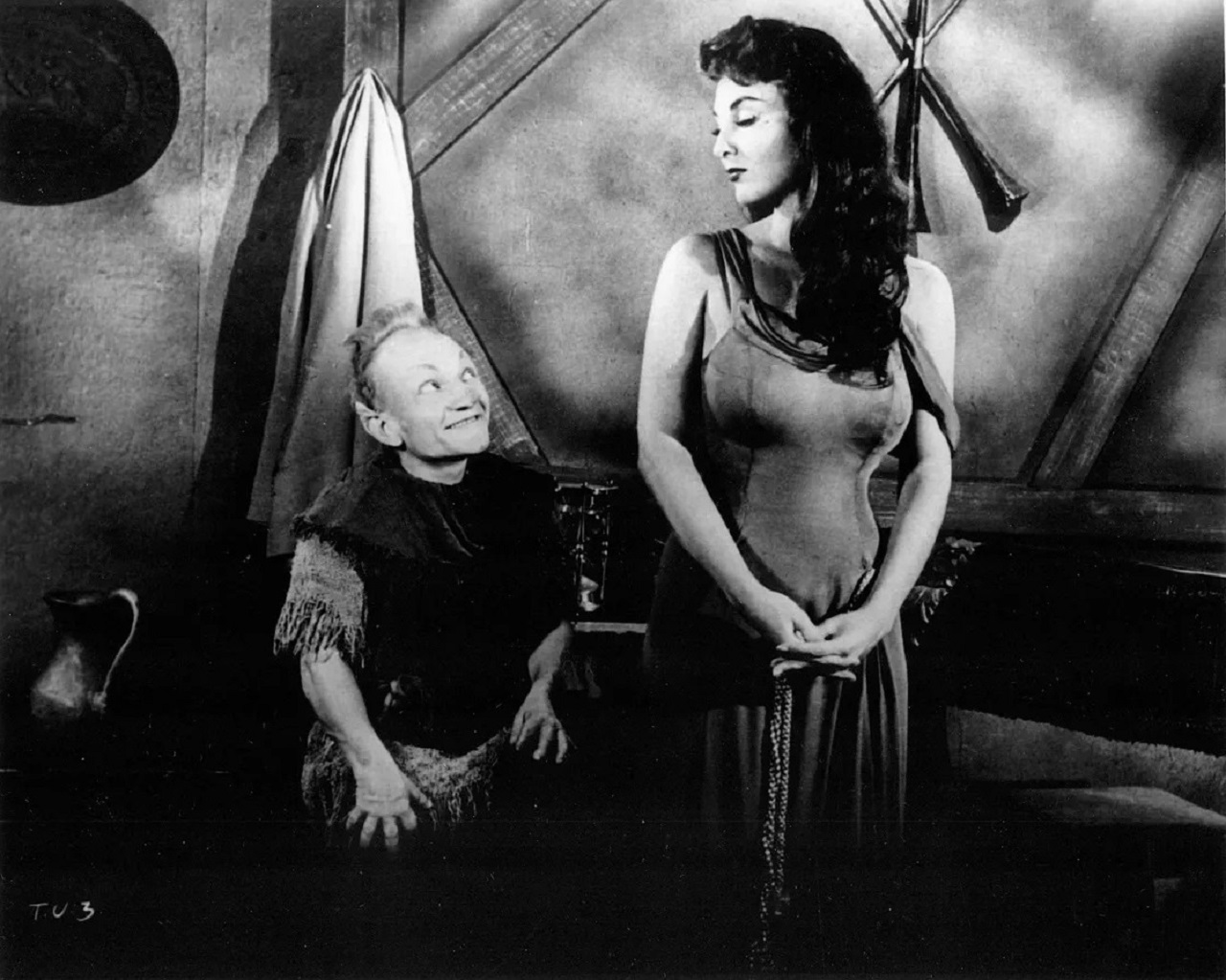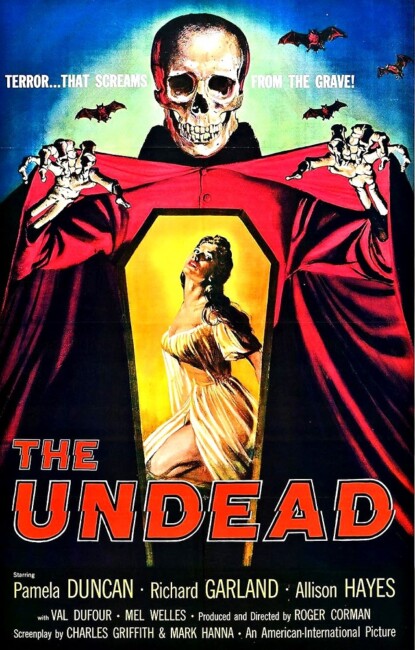USA. 1957.
Crew
Director/Producer – Roger Corman, Screenplay – Charles B. Griffith & Mark Hanna, Photography (b&w) – William Sickner, Music – Ronald Stein. Production Company – Balboa Productions, Inc..
Cast
Pamela Duncan (Diana Love/Helene), Richard Garland (Pendragon), Allison Hayes (Livia), Val Dufour (Quintus Ratcliff), Mel Welles (Smolkin), Dorothy Neumann (Meg Maud), Maurice Manson (Professor Ulbrecht Olinger), Billy Barty (The Imp), Bruno VeSota (Scroop), Richard Devon (Satan), Richard [Dick] Miller (The Leper)
Plot
Quintus Ratcliff hires the prostitute Diana Love and takes her to his former professor Olinger who runs the American Institute of Psychical Research. To prove a point to Olinger, Quintus places Diana under hypnosis and is able to regress her to her past life in the Middle Ages as Helene, an innocent woman who has been sentenced to burn for witchcraft. Speaking to her past self, Diana is able to guide Helene to make an escape. As the witch’s sabbat nears, the real witch Livia, aided by Satan himself, appears, trying to get the knight Pendragon and others to apprehend Helene. Saving Helene from the pyre requires Quintus himself to travel back through time.
The Undead was one of the early films from cult director/producer Roger Corman. Corman started out in the 1950s where he made a number of quirky B movies including the likes of It Conquered the World (1956), Attack of the Crab Monsters (1957), Teenage Caveman (1958), A Bucket of Blood (1959) and The Little Shop of Horrors (1960), among others. He gained a critical respectability with his colour production of The House of Usher (1960), which led to a series of Edgar Allan Poe adaptations throughout the 1960s. (See bottom of the page for Roger Corman’s other genre films). In the decades since, Corman has become a prolific producer of B movies, founding studios such as New World Pictures, Concorde and New Horizons with his name appearing as producer on over 400 films.
The Undead was an early Corman production, made before his acclaim with his Edgar Allan Poe films. Many of the Corman stock troupe has been assembled – actors Mel Welles, Buno VeSota and Dick Miller, as well as screenwriter Charles B. Griffith, all of whom would be key figures in The Little Shop of Horrors, along with other regulars like Richard Garland, Pamela Duncan and Dorothy Neumann.
The Undead came out amidst the Bridey Murphy fad of the 1950s. Mail-order salesman Morey Bernstein published a book The Search for Bridey Murphy (1956) in which he claimed to have hypnotically regressed housewife Virginia Tighe and gotten her to recall her previous life as Bridey Murphy in 18th/19th Century Ireland. The story became a sensation and a film was quickly made – see The Search for Bridey Murphy (1956) for a more detailed account. This was followed by a whole host of films that tapped into hypnotic regression and past lives regression themes with the likes of I’ve Lived Before (1956), The She-Creature (1956), The Aztec Mummy (1957), Blood of Dracula (1957), I Was a Teenage Werewolf (1957), The Bride and the Beast (1958), The Alligator People (1959) and Face of the Screaming Werewolf (1964), even a Bowery Boys comedy Hold That Hypnotist (1957) and a Barbra Streisand musical On a Clear Day You Can See Forever (1970).

Corman shot The Undead on a low budget – the sets for the village, graveyard and forest were all build inside a disused supermarket – and sometimes this does undeniably show through. Mystery Science Theater 3000 (1988-99, 2017-8) ridiculed the film but there is far more to it than that – despite the low budget, an undeniable imagination shines through. Indeed, you wonder if some of the scenes with the coach moving through the forest influenced Mario Bava a couple of years later with Black Sunday (1950), which also centres around witchery and has similar moody scenes set in forests.
The Undead is an odd little film. The script stirs a wild mix of elements – Bridey Murphy styled hypnotic regression, witches – both sultry and of the gnarly, warty kind – and witch persecutions, the evil witch and her imp companion (dwarf actor Billy Barty) undergoing animal transformations, appearances from The Devil who at one point sets up shop in the graveyard making deals for people’s souls. Oh and a time travel plot – in fact, by the end, it is quite a sophisticated time travel plot that shows how saving Helene’s life would have consequences through time. Charles B. Griffith tells how he had originally written the dialogue in iambic pentameter but this was shot down by AIP and it rewritten. As such, the dialogue sounds fake on the ear – just people speaking in regular American accents but saying everything with a proliferation of thees and thous.
The film’s one find is Allison Hayes, a year before going on to gain a cult fame as the title role in Attack of the 50 Ft. Woman (1958) – that film’s screenwriter Mark Hanna also co-writes with Griffith. Hayes plays with a sultry seductiveness that imprints itself on much of the show in ways that the far more nondescript lead Pamela Duncan does not.
Roger Corman’s genre films as director are:– Day the World Ended (1955), It Conquered the World (1956), Attack of the Crab Monsters (1957), Not Of This Earth (1957), The Saga of the Viking Women and Their Journey to the Waters of the Great Sea Serpent (1957), Teenage Caveman (1958), War of the Satellites (1958), A Bucket of Blood (1959), The Wasp Woman (1959), The House of Usher/The Fall of the House of Usher (1960), Last Woman on Earth (1960), The Little Shop of Horrors (1960), Creature from the Haunted Sea (1961), Pit and the Pendulum (1961), Premature Burial (1962), Tales of Terror (1962), Tower of London (1962), The Haunted Palace (1963), The Raven (1963), The Terror (1963), X – The Man with X-Ray Eyes (1963), The Masque of the Red Death (1964), The Tomb of Ligeia (1964), The Trip (1967), Gas; or It Became Necessary to Destroy the World in Order to Save It (1970) and Frankenstein Unbound (1990). Corman’s World: Exploits of a Hollywood Rebel (2011) is a documentary about Corman’s career.
Trailer here
Full film available here


